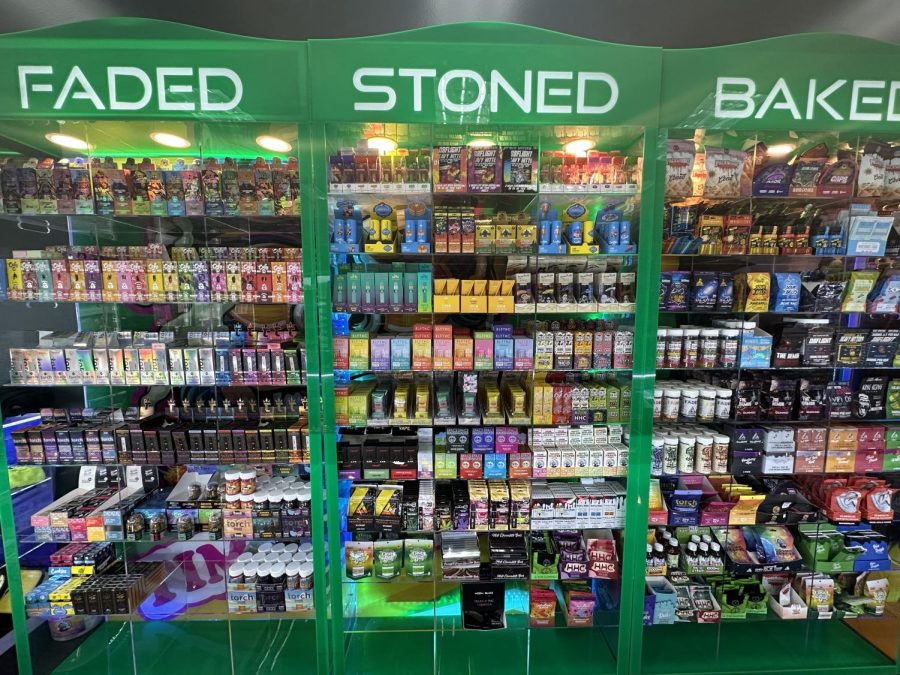Delta-8: marijuana alternative widespread across nation
Delta-8 displays of products, found at one of the FlashVapes locations on East Main Street.
April 18, 2023
Students are getting legal highs through delta-8 THC as marijuana remains illegal at the federal level and on campus.
Since the passage of the 2018 Farm Bill, which made hemp legal, products containing delta-8 have spread to the shelves of smoke shops and gas stations – including at least three within one mile of campus.
The bill defined hemp as any cannabis or cannabis derivative that contains less than .3% THC, which the authors specified as the cannabinoid delta-9 THC – a Schedule 1 substance found in marijuana. Because natural delta-8 is only found in small quantities in hemp, it is often chemically synthesized from hemp-derived cannabidiol, also known as CBD.
Tricia Knoles, an administrative sergeant with the Kent State University Police Department, said officers cannot cite students for the use or possession of delta-8.
“It’s not against the law,” she said. “I don’t believe CBD is even written into policy.”
Sometimes referred to as the “nicer, younger sibling” of delta-9, both cannabinoids have psychoactive and intoxicating effects and nearly identical structures. However, while recreational marijuana remains illegal in Ohio and on campus, there are no restrictions on delta-8.
Knoles referred to the office of student conduct for university-specific policies.
“CBD products are not banned and, now I don’t know enough about delta-8 to understand what the ingredients are, the people who would be referring that to us would be our police,” said Todd Kamenash, the associate dean for conduct and community engagement.
Google searches for delta-8 increased by more than 850% between 2020 and 2021. Eric Leas, an assistant professor of public health at the University of California, San Diego, said delta-8 is most popular in states that do not have recreational marijuana. Only 21 states regulate, restrict or ban delta-8, including states often seen as leaders in drug policy such as Colorado and California.
While the compound is legal in Ohio, it also goes unregulated. There is no standard for packaging and safety labels, which can mislead consumers about what they are purchasing. Of the 2,362 exposure cases of delta-8 products recorded by poison control centers nationwide between January 1, 2021 and February 28, 2022, 40% were unintentional exposures, according to the US Food and Drug Administration.
“The recreational system for cannabis has a whole suite of regulations that govern testing a product, where it can be sold, how you can advertise it and that all falls under state cannabis laws,” Leas said. “What manufacturers of delta-8 are arguing is that these products are not cannabis products, they’re hemp products.”
Concern over the safety of delta-8 products culminated in September 2021 when the Centers for Disease Control and Prevention issued a health advisory. The FDA issued a similar warning in May 2022, citing 102 adverse events, including hallucinations, vomiting, tremors, anxiety, dizziness, confusion and loss of consciousness.
Leas said little is known about the chemicals used in the synthesis process or their health effects, and that dosage varies throughout products.
“Here in California, we have regulations to make sure that when you’re getting a product it’s pretty accurately dosed to where if it says 10 milligrams, you’re pretty confident it’s going to be 10 milligrams,” he said. “In the market for delta-8 products, there isn’t any regulation on that, and there’s pretty substantial evidence that doses vary widely. So, you could be getting a lot more or a lot less than what is labeled on the product.”
Without oversight, marijuana alternatives are advancing faster than legislation. Products labeled as “legal delta-9” that are synthesized from CBD and put in 10-gram gummies as 30-milligram doses, and entirely artificial cannabinoids known as THC-O-acetate, are popping up in stores and online.
“It’s potentially more concerning than delta-8 because, at least in terms of anecdotal reports, people say it’s more psychedelic, almost more like an LSD trip,” Leas said. “So, that one’s more potent than cannabis would be but also, at this point, technically compliant with the hemp laws.”
Alton Northup is a reporter. Contact him at [email protected].


























